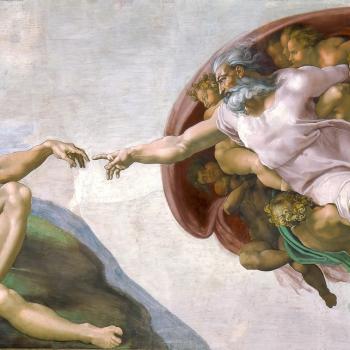Note: This is the second of three essays. Number one was entitled: The infallibility of the mass media; this one – number two – is entitled: The infallibility of science; and Number three will be entitled: The infallibility of the Bible.
The Infallibility of Science

The third shock to my naïve credulity – after I had survived the shattering of my innocent belief in both papal infallibility and the infallibility of the mass media – came as I walked the hallowed halls of science, majoring in Mathematical Physics and Pure Mathematics (the queen of all the sciences) at The National University of Ireland at its University College Cork campus. Even in my great love of science and admiration for the scientific method, I quickly learned that science, too, is a story investigated and told by very fallible humans. So, I embrace all of its contributions even as I reserve the right to sometimes say, “Naw, I don’t think so.”
Science as Revelation
Science has become the new religion; its discoveries the most trusted form of revelation. The scientific method has, indeed, given us many great benefits – with some serious side effects. But, like all revelation, science is far from infallible and needs to be constantly evaluated using Aquinas’s criterion (truth is found only in the judgment) and, I humbly suggest, using my own definition of “truth” – something is true if it transforms me and aligns me with God/Love.
The scientific method itself, though it does, indeed, deliver significant practical benefits, is based on probabilities, typically at “p-values” at less than 5% -which means there’s only a 5% chance that the results happened randomly. Thus, “probable” is conflated with “proven.” So, in fact, experimental science can never prove anything but merely establish probabilities based on an acceptance of its postulates and methodology. And it’s a very recent and young story. Other stories have been just as satisfying to the populace and lasted much longer. Since it’s another kind of storytelling, then, like all stories and storytelling cultures, it is only consistent within its own parameters and methodology. Once you accept the postulates and parameters and methodology of any storytelling culture, then its “findings/truths” are consistent.
Science – when theories become laws
The brilliant biologist Rupert Sheldrake has written a book called Science Set Free: 10 Paths to New Discovery in which he points out how ten major “tenets” of science are, in fact, just theories that have been iterated so often that they have morphed into “laws.”[i] He has been censured by some in the scientific community and accused of blasphemy. His 2013 TED talk, The Science Delusion, was taken down until popular protest got it reinstated. Here is a quick synopsis of these theories-become-laws:
#1 Nature is simply a machine and all its parts are machine parts – the cosmos itself, plants, humans…So brains are merely programmed computers
#2 Nature had no consciousness until it “emerged” in some animal/human brain.
#3 The laws of nature were fixed at the moment of the Big Bang and can never change.
#4 The total amount of both matter and energy in the cosmos has been unchanged since the Big Bang.
#5 Nature is purposeless – there is no teleology to it. Evolution is blindly going nowhere.
#6 Biological inheritance is purely material via DNA.
#7 Memories are stored materially in the brain.
#8 Mind is nothing but the activity of the brain.
#9 Psychic phenomena are an illusion – a mind confined inside the head can’t possibly have effects at a distance.
#10 Mechanistic medicine (i.e. surgery, radiation, and chemotherapy) is the only kind that works.
Taken together, Sheldrake’s criticisms assemble powerful evidence for the way in which our notions of reality are often constructed upon hypotheses rather than upon proven facts. And the scientific community’s response to Sheldrake, and many other brave scientific souls before him, shows us that power corrupts, and that questioning authority is frequently seen as anti-social, unscientific or irreligious. No prophet is accepted in his own household.
Fundamentalism in science
For all its braggadocio, militant atheism has a much more difficult time trying to prove that God does not exist than timorous, doubt-filled theists/believers have in proving She does exist. This is true, firstly, since absence of evidence is not evidence of absence; and, secondly, even a single black swan, however long it takes us to discover it, immediately negates the proclamation that “all swans are white.” Moreover, when you get down to the individual arguments, the application of Occam’s Razor heavily favors the existence of some kind of mastermind behind project cosmos. Parsimony and elegance favor God’s existence.
Of course, it is very healthy to exercise discernment in dealing with the issue. I find that the spectrum of reactions to any proposition can be divided into five basic stances. First, come the Innocent who have no boundaries to their credulity. They are totally open and simply swallow any thesis without objection. In group two are the Naïve. These, while not being quite as gullible as the Innocent, have very permeable boundaries and, after a few tentative objections or questions, succumb completely to the arguments of the proponent. In group number three are the Critical Thinkers who examine all of the evidence with an open but very discerning mind, and are prepared to abandon even fervently held prior positions in the light of powerful new evidence. This, I believe, is the optimal stance when dealing with any topic including religion, revelation and science.
In group number four are the Skeptics, who are partially closed, and who only open up to “extraordinary” evidence. I find myself, here, in opposition to Carl Sagan’s statement that extraordinary claims demand extraordinary evidence. I have great regard for Sagan, but this is one of those statements which sound very profound but which, I believe, are actually pretty dumb. Why would any claim need to be subjected to test criteria or protocols which we would also not apply to the “hard sciences”? For example, the standards which mainstream science demands of parapsychological research are way in excess of what it demands of its own research. And even when top class research in parapsychology uses these “ultra-protocols”, the skeptics (and especially the debunkers) are still not convinced.
Finally, comes the Debunker group. These are people who are totally closed and whose modus operandi is to arrogantly act as if they already have the full truth, and any claim that might make a dent in that infallible edifice must ipso facto be false. Without ever examining the evidence, they “know” that the new claim cannot be true. All that remains to be done is to find the best way to discredit the research or, failing that, the good ol’ “argumentum ad hominem” is frequently summoned to the fray. This group cleaves to its positions with a religious fervor that would put even the most fanatical God-fearers to shame.
I’ve never heard anybody describe himself as “a close-minded scientist.” Each of us thinks we are in the correct place, all others are (too far) to the right or left of us in their opinions. Self-perception is a very fallible science. Latin warns us: “nemo iudex in causa sua” (nobody can be the judge in their own case.) As an example of that, 90% of Americans consider themselves “above average drivers”!
In the search for truth, in any discipline, we must allow the data to construct the theory, not the pre-conceived theory to decide which data are admissible. Again, I want to emphasize, this must be true in all forms of revelation – science, religion, “news”, or scriptures.
Major faux pas by prominent scientists
In 1807, Thomas Jefferson who was then President of the American Philosophical Society (the equivalent of today’s American Association for the Advancement of Science) reacted to a report of a discovery of a meteorite by two Connecticut astronomers with the statement, “I could more easily believe that two Yankee professors would lie than stones fall from heaven.”
In the nineteenth century, much of what is now twentieth-century science was laughed at. The renowned physicist and former President of the British Royal Society, Lord Kelvin, stated in 1900, “X-rays are a hoax!” Kelvin had a reputation for hubris and a sense of his own infallibility. Here are some more of his decrees: in 1895, he opined, to the Australian Institute of Physics, “heavier-than-air flying machines are impossible.” And in an address to an assembly of physicists at the British Association for the Advancement of Science in 1900 he stated, “There is nothing new to be discovered in physics now. All that remains is more and more precise measurement.”
“The theory of germs is a ridiculous fiction,” said Pierre Pochet, professor of physiology in Toulouse, France, when he learned of the germ theory of disease developed by Louis Pasteur, who was a crystallographer, not a doctor. Others even refused to look at his data.
“The abdomen, the chest, and the brain will be forever shut from the intrusion of the wise and humane surgeon,” said Sir John Eric Erichsen in 1837; he was later to become Surgeon-Extraordinary to Queen Victoria.
Perhaps the most famous “expert statement” of all came from Charles H. Cuell, Commissioner of the U.S. Office of Patents, who urged President William McKinley to abolish the Patent Office in 1899 with the assertion, “Everything that can be invented has been invented.”
Even Albert Einstein, the face of science for the 20th century, spent the latter half of his life trying to disprove the findings of Quantum Mechanics.
Even when these grievous errors have been acknowledged, a smug scientific attitude will then say that, though individual scientific claims have been subsequently discredited, the scientific method per se, is infallible, since it always, eventually, corrects its own errors. This is a very handy “blank check” that absolves it from all previous sins and promises that even present hidden sins, once they are discovered, will be remedied. Nice piece of self-exculpation! So, we are expected to still trust science since its present “truths” will be abandoned once contradictory truths have been established. Thus, not only does it forgive itself for past sins, it prophylactically forgives itself for its current crop of errors because someday they, too, will simply be past mistakes. How can you lose with that kind of deft footwork?
Of course, there are two kinds of ignorance: first, stuff we don’t know but we know that we don’t know it (e.g., how to define “consciousness”); and, second, stuff we don’t know, and we don’t know that we don’t know it (e.g., an undiagnosed and therefore untreated cancerous tumor.)
Like all of the storytelling cultures that preceded it, science is very fond of patting itself on the back. But it, too, will prove to be a temporary story, and will give way to a much greater future story. I believe that that future story will be some form of deeper mysticism whose adherents I’ve called, “mysticists” – people for whom the mind, heart, and soul are a trinity of antennae, receiving, deciphering, and acting upon unconditional love, pure awareness, and unity consciousness.












